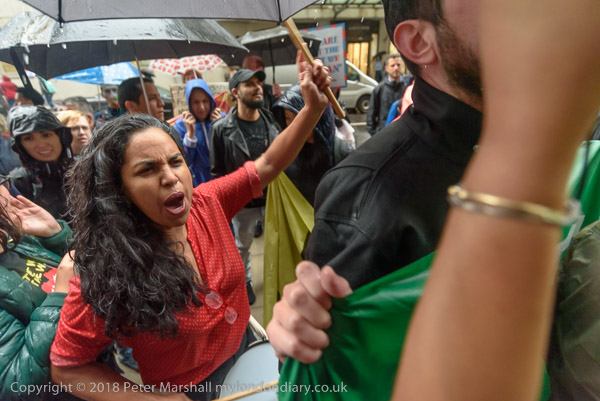
The Ministry of Justice at times appears to be titled in best Orwellian manner, and certainly so far as its low paid staff – such as the cleaners – are concerned it is very much a Ministry of Injustice. It’s place I’ve attended a number of protests outside, about the treatment of refugees and asylum seekers, about prisons, about privatisation of probation services, aboujt the slashing of legal aid and more. Most recently I’ve been there a few times about the rock-bottom wages and lousy conditions of employment for the people who keep the place clean.
One major reason that our UK benefits system has become so complex, leading to the fiasco over the introduction of Universal Credit, is that we have become very much a low pay economy, at least for those at the lower end of employment. Partly this is because of the huge salaries and other payments given to the people at the top, but more it reflects the contempt the well-off largely feel for those at the bottom.
Universal Credit aims to drive people into work by cutting benefits; its proponents say that aims to make work pay, but unfortunately they have failed to make work pay enough to live on, particularly in London, where costs are high. It seems to me axiomatic that any full time job should pay as a minimum a real living wage. Paying benefits to people because their employer doesn’t pay them enough to live on – as our system does is a subsidy for inefficient or unscrupulous employers (just as housing benefit is a subsidy for landlords.) And of course there are many jobs that the state should pay for people to do, either directly or thorugh employers, but it should be deciding what these are and not leaving it to the whims and distortions of private companies.
Cleaners perform a vital role at the offices of the Ministry of Justice, as they do elsewhere, and should be paid at least enough to live on, which is the figure published annually as the London Living Wage. It seems to me a simple matter of justice, but that seems to be in short supply at the ministry.
The campaign here is one of a number being fought for low paid cleaners by the United Voices of the World trade union, which many employers refuse to recognise and try to avoid having to deal with. The large established trade unions – with a few notable local branch exceptions – have not been very succesful in recruiting low paid workers and dealing with their problems, particularly when many of these workers don’t have English as their first language. They often have cosy arrangements with large employers and are ‘recognised’ as representing low paid workers even when they have few if any members among them. Unsurprisingly they haven’t done much for those at the bottom.
Unions such as the UVW are ‘grass roots’ unions with few if any paid staff – and those who work for them generally do so on the London Living Wage they fight for on behalf of their members. They are small enough to have simple democratic structures where every member can have a say – and in their first language. They organise effective protests at workplaces, but also educational classes (particularly language classes) and social events, a few of which I’ve been invited to and have enjoyed.
The main problem in photographing the event was the weather. The protest began in light rain, but it was soon pouring, and there was only very limited shelter. Some of the protesters were directly against the wall of the building, where an overhang gave some protection, while others stood in the rain under umbrellas.
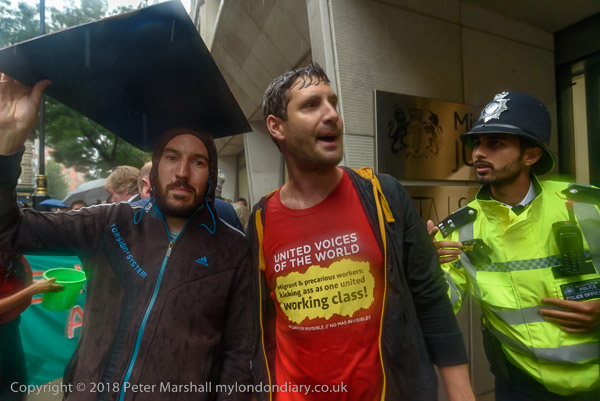
I had an umbrella with me, but it isn’t easy to take pictures holding one – cameras really need both hands to operate. And sometimes I could stand with those under the underhang, but it wasn’t always the right place to be to take pictures. Occasionally I could stand under one of the umbrellas various people were holding, but more often I was standing a little further away and they poured water down on me.
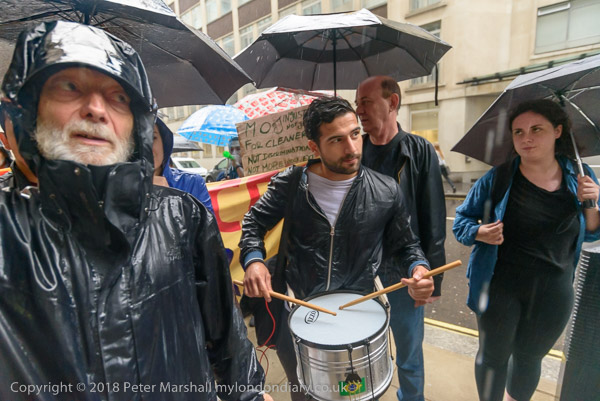
I was getting very wet, and so were the two cameras I was using. Both the Nikon D810 and the D750 have some weather protection, though the lenses are leaky.
I usually keep the D810 on a sling strap at my side, with the lens pointing down, and on the 28-200 I have a screw-in lens hood which offers some limited protection. It isn’t perfect, and vignettes slightly at the wide end when working full-frame, but it’s a great improvement on the plastic Nikon version, which used to fall off at the slightest provovacation. It was an odd size and I think no longer made. I managed to replace the first one I lost after long searching on the web, but it cost £20 and when that one disappeared I decided to go for a generic screw in one.
The D750 with a wide angle uses a more standard lens hood. Still falls off if looked at hard, but when I lose them it’s only a couple of quid for a Chinese replacement (actually slightly better than the genuine thing.) But any lens hood you can use on a 18-35mm isn’t too effective at keeping the rain off. I have the D750 on a fairly short neck strap, and slip it inside my jacket when it rains, but this means leaving the zip down some way on the jacket – and I get a wet neck and chest.
In my hand when photographing in wet conditions I have a large microfibre cloth, to wipe cameras and lenses. As well as the filter on the front of the lens, its important to keep the tubes of the zoom lenses dry, or else water migrates from them into the lens and condenses as a mist on the elements. And doubtless also on the mechanical bits inside the lens, which I’m sure isn’t good for them.
When I’ve got the camera with the wide-angle in my hand I make a ball of the cloth and hold it in the front of the lens to protect it from rain drops – glass seems to have a strong magnetic effect on them – only removing it briefly to frame and expose each picture.
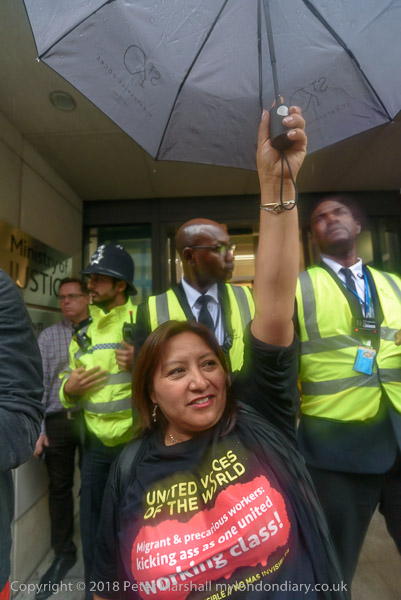
But for part of this event my job was made much easier, as one of the UVW members, seeing me getting rather wet, came and acted as my assistant, holding an umbrella over me and keeping the worst of the rain off. I was extremely grateful to her. Later the rain did stop and it was easier to work, and for Shadow Justice minister Richard Burgon to come and support the workers in his shirtsleeves. And by the end of the protest the cleaners and supporters were dancing in the street outside the ministry.
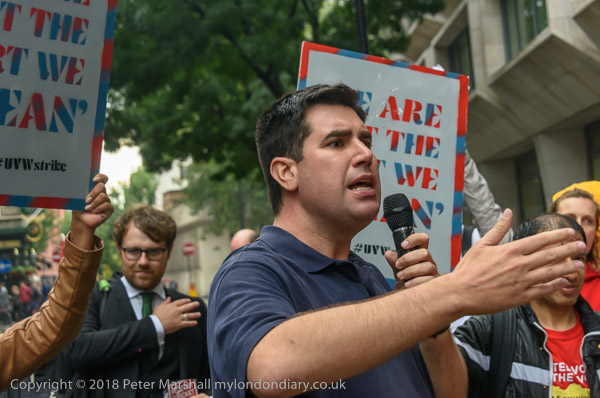
Three months later, the dispute is still ongoing, with the Minister of Justice refusing to meet with the UVW. I’m sure there will be more protests soon.